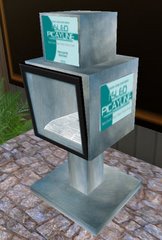by Barbara Payne
Editor's note: The topic of identity has heated up (again) on the listserv, provoking many thoughtful responses. I do not agree with them all, but I wanted to try to post a couple different perspectives to give a feel for the conversation. - Ross/Milo
I've been following this discussion about providing real life information in SL. While I have some of the normal concerns about security and privacy, we must also tackle the problem of credibility. If we are working with educational objects/sims, we need to provide some reassurance to users that we have the credentials to back up what we are doing.
A cornerstone of information literacy, is "who" is behind this information on a webpage or in a virtual simulation. Is it biased, accurate, etc..?
I frankly don't see how we can totally protect privacy in Second Life and still provide the credibility necessary to give users sufficient confidence to trust what we are providing in the virtual environment.
I don't want to watch an inworld presentation on a screen, take notes and then find out it was a project created by an undergraduate student who's plagiarized the content and only had 4 weeks of training in that field/course--whatever it is. I want to know WHO the author is of content, simulations, activities, and anything else in SL. Is the purpose of this activity completely commercial? Is it intended for undergraduates? graduates? Was it created by someone with vast experience? no experience? Who's going to police educational objects and activities for accuracy? How will a user make a judgment about the quality of a sim?
Credibility wins over privacy and security regrading educational activities and objects in Second Life-- especially as long as this is open for anyone without any scholarly evaluation measures.
Thursday, June 7, 2007
Subscribe to:
Post Comments (Atom)


No comments:
Post a Comment